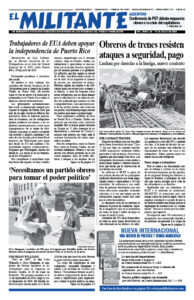MONTREAL — The National Assembly of Quebec adopted Law 96 on May 24, declaring French the province’s official common language and enforcing its use. Under the pretext of combating the “declining use of French,” the bill restricts the use of English and any other language apart from French. The questions posed here are critical for building the revolutionary workers movement in Quebec.
“Law 96 aims to divide workers. Our unions should fight it,” Katy LeRougetel, Communist League candidate for Montreal’s Anjou-Louis-Riel riding in the upcoming elections to the National Assembly. She was speaking at a Militant Labor Forum here June 4. “This is crucial for the unity of the working class at a time when attacks by bosses are sharpening under the impact of the growing crisis of their system.”
Under the law, as of June 1 the Quebec government will make public services to the population in French only, with the partial exception for the long-established English-speaking community. English is the first language of close to 15% of the population and the second language of many immigrants who don’t speak French.
After six months, newly arrived immigrants will receive social services only in French.
Medical staff will not be able to communicate with patients or with each other in any language other than French, a step denounced by many doctors and nurses as well as immigrant groups because it undermines access to health care.
Government inspectors are now authorized to conduct warrantless searches of workplaces and seize records and computers to enforce the law.
It limits access to those public pre-university colleges (called CEGEPs) where the instruction is in English. In Quebec, only children whose parents or siblings had attended English-language schools in Canada are permitted to go to English-speaking schools. Many French-speaking youth have until now enrolled in English-speaking CEGEPs in order to improve their English. This right will now be restricted.
In addition, Law 96 adds three classes in French for students to graduate at English-language CEGEPs, on top of the two they already have to complete. This new requirement was denounced among others by the Assembly of First Nations of Quebec-Labrador and several other Aboriginal organizations.
Many Aboriginal communities speak English and not French as a second language. Learning a third language in a CEGEP will add further barriers to the education of Aboriginal youth, who already face a high dropout rate in schools.
Pushed through by the governing Coalition for the Future of Quebec, Law 96 follows the passage of Law 21 in 2019. In the name of “secularism,” that law prohibited many government employees from wearing religious symbols at work, especially targeting Muslim women, and Jews and Sikhs who wear the veil, skullcap or turban.
An increase in bilingualism
Inhabitants of Quebec who are native French-speakers make up some 80% of the population of the province. Historically, they were oppressed and discriminated against by the Canadian rulers. This setup provided bosses with a weapon to foster divisions based on language, allowing them to lower wages and conditions for a section of the working class, weaken struggles by workers to defend our common interests, and undermine the labor movement as a whole.
But these inequalities and divisions were largely overcome through four decades of massive struggles, including hard-fought strike battles in the 1970s that won the support of workers and unions across Canada.
“Contrary to what the government claims, French is not declining in Quebec,” LeRougetel said. “In 2016 more than 94% of the population could converse in French. It is the language most often used at work.”
What is increasing, she explained, is French-English bilingualism. From 1961 to 2016, the percentage of people who were bilingual in Quebec almost doubled, rising from 26% to 45%.
“It is this growing unity of the working class that Law 96 seeks to reverse,” said LeRougetel. “It’s a threat to the bosses and their governments as they try to resolve the deepening capitalist crisis on our backs.”
She said debating this broadly in our unions and the working class is crucial, pointing out that most trade union officials support Law 96, which undercuts the unity workers need.
On all political questions, she said, unions need to act independently of the bosses’ parties and their governments and start from workers’ common interests. That requires building our own party, based on the unions, to lead the fight to take political power out of the hands of the capitalist rulers and establish a workers and farmers government.
The forum launched LeRougetel’s campaign for elections that take place Oct. 3. The Communist League will also run Félix Vincent Ardea in the Marquette riding, in the west of Montreal.

